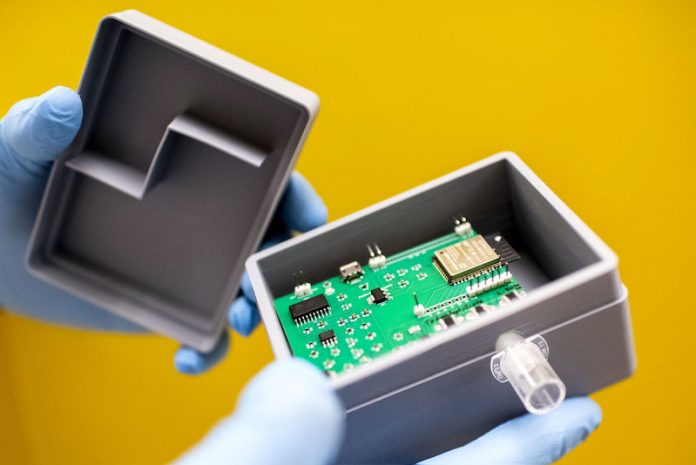
In a new study, researchers have developed a new sensor that could detect COVID-19 particles in the air fast.
The research was conducted by a team at Northeastern University.
As schools, businesses, and other organizations plan their strategies to reopen during the COVID-19 pandemic, testing people regularly for the coronavirus will be one of the key components in attempts to slow and control new waves of cases.
But current testing technologies can be slow—too slow—for the rapid spread of the virus.
A positive test today doesn’t necessarily mean someone is still free of the virus two days later, which is about as long as the test results would take to be delivered if you are in the U.S.
That’s why technology that can perform instant and frequent testing could serve as an important weapon in the fight against a pandemic that has already taken a significant toll on people, markets, and governments around the world.
The team created a gas sensor for different molecules in the air. It’s a device that can probe the chemistry of airborne pathogens, including the SARS-CoV-2 coronavirus, which causes COVID-19.
And, like a breathalyzer that can give results in real-time, it works within seconds.
The device uses electrochemical sensors consisting of a special material imprinted with cavities that are the same shape and size as the crown-like structure of proteins that cover the SARS-CoV-2 virus.
Like missing pieces from a puzzle, those proteins (and only those proteins) fit within the cavities of the material.
The sensors basically catch those particles from the air. Then, the material reacts with the proteins and sends an electrical signal indicating that the virus is present.
Because the microscopic imprints on the sensors are the same exact shape as the coronavirus spike proteins, the device provides high sensitivity and accuracy.
In his lab, the sensors have shown to be as effective at detecting the coronavirus as the gold standard in current testing, using polymerase chain reactions.
The process for that kind of testing involves making millions of copies of the genetic material to detect the coronavirus. But it can take days and highly specialized laboratories to conduct.
And because of the logistical limitations of needing to swab people’s nostrils and waiting for those samples to be shipped for analysis, handheld devices that can accurately analyze exhaled breath instantly could be a game-changer.
Now the team is working with the medical community to test his device, and get emergency authorization from the U.S. Food and Drug Administration to use it in different settings.
One researcher of the study is Nian Sun, a professor of electrical and computer engineering at Northeastern.
Copyright © 2020 Knowridge Science Report. All rights reserved.



